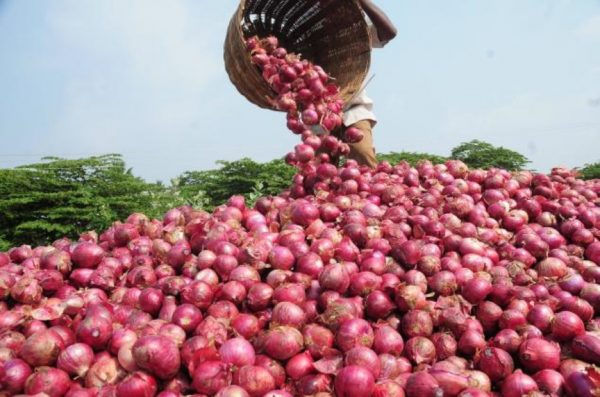How onion proceeds stimulate cultivation in Plateau despite expensive input
Over the years, the price of onions in the country has been fluctuating, such that it can become so expensive that purchasing one or two pieces can become difficult for some families, while at other times it is cheap and surplus and bought at almost giveaway prices. Despite the price fluctuations which are often determined […]

Over the years, the price of onions in the country has been fluctuating, such that it can become so expensive that purchasing one or two pieces can become difficult for some families, while at other times it is cheap and surplus and bought at almost giveaway prices.
Despite the price fluctuations which are often determined by varied factors and/or market forces, farmers still cultivate it in considerable quantity. This is currently its planting season, and the farmers in Plateau State have engaged in its cultivation.
A farmer in Jos, the Plateau State capital, Mrs Atong James, said apart from the price fluctuation in onion, another critical thing is that some of the farming inputs are very expensive because onions are easily infested by insect and has to be sprayed and well nurtured.
Mrs James who farms in Lamingo area of Jos said insecticide is required by every onion farmer. This is in addition to the fertilizer that needs to be procured and applied for good germination.
Why Abuja fish farmers increase catfish price from N1,100 to N1,800 per kg
AGRO SOLUTIONS: Benin’s sugarloaf pineapple classified ‘World’s Sweetest Pineapple’
“Onion planting is already in progress. This year, I can see that there is gain in onion cultivation and business. This is because the price of a big is already between N50,000 and N60,000, and it may be more gainful when we harvest this one,” she said.
Another farmer in Jos, John Ajiji, said he has been planting onions for about four years now and has been getting good yield and profit. He equally agreed that their major problem this year is the fuel to power the irrigation farming as onion is cultivated during dry season and it requires the irrigation system to grow the farm.
According to him, they buy a gallon of fuel for N3,500, and he uses up to two gallons a day, making it N7,000, which is very difficult for a small holder farmer to afford.
Ajiji, who farms in Jos North and Jos East and is also a traditional title holder, said apart from the fuel issue, accessing fertilizer has always been a perennial problem to battle with. He said they are planting now and hope to harvest in April next year, but nurturing the farm till then, in terms of the fuel cost and fertilizer, might be overwhelming.
He, however, said he is determined to go ahead with the cultivation because of the gain he is expecting to make, explaining that last year, he got about 32 bags from about 3 little containers of seedlings, and this year he is more hopeful.
An onion seller at Jos vegetable market who equally cultivates the crop, Ibrahim Gambo, spoke on the gains, price fluctuation, marketing strategy and cultivation of onions.
He said to make gains whenever he cultivates and harvests his onions, he would store them and target when the price is up before selling them, while he would continue to buy and sell from other farmers or sellers alike.
He explained that apart from storing his own onions harvested awaiting for the price to rise, he also buys from others and store as well for the same reason, adding that if both farmers and vegetable sellers know the profit in onions, they would be deeply involved in it.
Ibrahim said onions always sells and it has no specific price, and that sometimes, it follows the law of demand and supply of “The higher the price, the lower the quantity demanded and the lower the price, the higher the quantity demanded.”
“Again, whenever onions is brought into the market in large quantities, the price often falls and vice versa. That is how onion price is often determined. Today, you can buy it at a particular price, and the next day, the price changes. Sometimes, you can even buy it at a particular price in the morning, and in the afternoon, the price changes,” he said.
